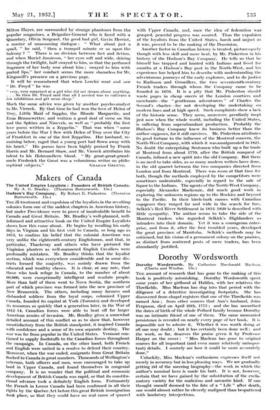The Irrational Age
Under the Fifth Rib. A Belligerent 'Autobiography. By C. E. M. Joad. (Faber and Faber. 10s. tki.) MR. Joan is a good hater in the same sense that some men are called good losers, because they do not care sufficiently about the game to mind defeat. Life has given him much material for hatred, but his hatred has an air of unreality, as have cards played for high stakes by men who can afford to lose. Perhaps he is too witty to be convincing. He wants the 'world to be made rational, but in the meanwhile he enjoys the Gilbertian irrationality : the modem love of nature which is destroying the countryside ; the classical education which admitted him to the Civil Service and a career of writing long minutes- " on the number of drawers which should properly be contained by the desk of the secretary of a committee dealing with the em- ployment of boys and girls under seventeen belonging to Bootle.-
His autobiography, which contains little information about his life and a great deal about his opinions, is always amusing. He hits all round the compass. No one with any opinions at all can fail to raise horrified hands at some passage or another. His mind, he confesses, ceased to develop at twenty-three ; he ought to be relegated to an Edwardian museum with the sociological novel, the suffragette and the Fabian Society, but he is too outrageous for a museum :
" Shaw, he writes, became for me a kind of God. I considered that he was not only the greatest writer of his time (I still think that), but the greatest English writer of all time (and I am not sure that I don't still think that, too)."
Like the Discobolos at Montreal lie would have to be draped. He cannot be caught out. Laugh at him for a period enthu- siasm : he has already laughed at himself. Argue with hint and this wily rationalist has wriggled from the grasp with an unblushing irrationality. On one subject, pacifism, he is serious. His hatred of war is expressed with a bitter clarity ; patriotism fills him with " a kind of puzzled distaste " ; in this case the irrationality of man brings him nearer despair than laughter : " To the work of destruction they will bring a nobility, a forgetful- ness of self, a truly religious spirit which the work of construction is powerless to evoke. Thus, were it not for the good in men, most of the evil in the world would have remained undone."
This section of his book is a great performance ; it should receive the best of all applause, a long silence before the hands move.
Compared with this Mr. Waugh's analysis of the last thirteen years is very petty. Mr. Joad's generalized man is flashed in a close-up on Mr. Waugh's screen and loses his significance. He is just a " good fellow " who " can hold his liquor." Mr. Waugh mixes competently told fact with badly told fiction in an odd way. Real people, Mr. Hugh Ringsmill and Mr.
Milton Hayes, are surrounded by strange phantoms from the popular magazines, a Brigadier-General who is faced with a Quandary, Olivia Sergeant, the good bad girl, Gavin Ilerriot, a master of unassuming dialogue : " What about just a quail, " he said, " then a tranquil minute or so upon the balcony ? " There is no division between fact and fiction, and when Muriel Jamieson, " her eyes soft and wide, shining through the twilight, half swayed to him, so that the perfumed fragrance of her body rose about him ; swayed to him with parted lips," her conduct seems the more shameless for Mr. Kingsmill's presence on a previous page.
It Hill be remembered that when Lorelei went and saw " Dr. Froyd " he was "very, very surprised at a girl who did not dream about anything. , . . So then Dr. Froyd said that all I needed was to cultivate a few inhibitions and get some sleep."
Much the same advice was given by another psycho-analyst to Mr. Viereck. By that time he had won the love of Helen of Troy, Little Maid of Sappho, the Blonde Marguerite, and Erna Brausewetter, and written a good deal of verse on Sin and the Sphinx and Nineveh, as well as " probably the first love poem written in a Zeppelin." That was when " some years before the.War I flew with Helen of Troy over the City of Frankfort in one of the first Zeppelins. Her husband, re- maining below, raged that a young poet had flown away with his heart." His, poems have been highly praised by Frank Harris and Mr. Bernard Shaw, and Mr. Viercck attributes his talent to his Hohenzollern blood. " My great-great-grand- uncle Frederick the Great was a voluminous writer on philo-





































 Previous page
Previous page